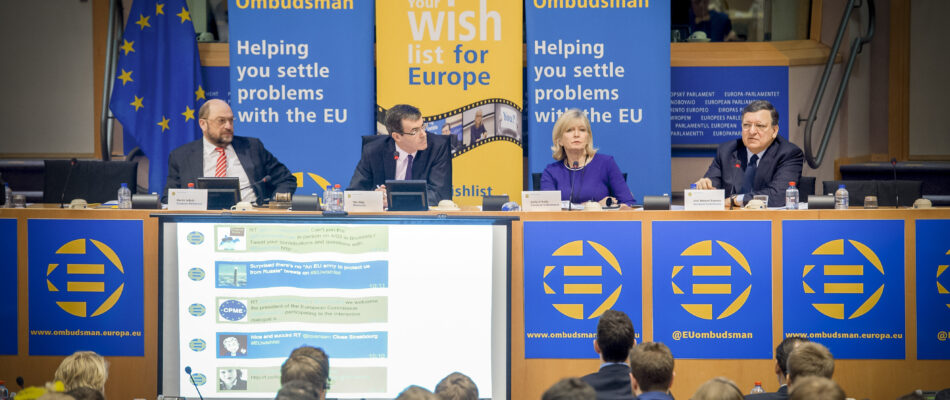
ESU’s wish list for Europe presented at the European Parliament
BRUSSELS – Students wish to see sustainable, accessible and high quality higher education as one of the main priorities during the next legislative term of the European Union. This wish was delivered by the European Students’ Union (ESU) directly to Martin Schulz, the President of the European Parliament, and José Manuel Barroso, President of the European Commission, at a debate event organised by the European Ombudsman, Emily O’Reilly, on 4 March.
With more than three hundred people participating in the event, ESU was happy to present its wish list for Europe in the form of a video made specifically for this occasion where citizens were invited to tell policy-makers about their wishes and concerns for Europe. This video presents ESU’s campaign for the European elections, where political candidates are asked to pledge to a manifesto of ten points that national unions of students want them to work for during the next political term. This video was presented to all the participants of the event just before the debate officially started.
“Especially in times of austerity and rising nationalism in the European Union it is important that people go out and vote. We in ESU are focusing on encouraging students to register for the elections and to go and vote. For this purpose we have launched the campaign Vote For Education which is encouraging candidates for the European Parliament to pledge to keep higher education a human right, a public good and a public responsibility,” says Rok Primozic, Chairperson of ESU.
ESU was happy to hear how many people talked openly about their concerns about education and that it became one of the main topics for discussion at the event. This interactive event also stressed the need for enhancing democratic clarity and transparency within the institutional structure of the European Union and to give people real power, so that their votes have a real impact on the decision-making processes.
Regaining trust in the EU
Both President Schulz and Barroso spoke about the need to regain trust in the European Union and the idea of cooperation. Schulz spoke in particular about his concerns for young people and graduates that are facing unprecedented levels of youth unemployment. It was important to not lose this opportunity of Europe having a generation of highly educated and active citizens.
“This was an excellent initiative organised by the European Ombudsman that gave us the opportunity to question directly the presidents of two out of the three main institutions of the European Union. It is important that policy-makers at all levels of the European Union work with and listen to the demands made by European citizens and stakeholder organisations. We have now presented our wishlist to them that we hope they will work for and support before and, more importantly, after the elections take place,” says Primozic.
People that were unable to attend this debate at the European Parliament were invited to send in their questions or participate in discussions online on Twitter. ESU used that opportunity to ask the panels question such as about transparency in the EU system and power of the European Parliament. President Schulz and Barroso were also asked where they would rate education on their EU wish list, but they did not respond to that question.
— END —
For more information, please contact:
Rok Primozic, ESU’s Chairperson: +32/479.126.390 // rok@esu-online.org or Robert Hlynur Baldursson, ESU Communications Manager: +32/473.669.894 // robert@esu-online.org

The European Students’ Union, headquartered in Brussels, is the umbrella organisation of 47 national unions of students from 39 European countries. ESU represents and promotes the educational, social, economical and cultural interests of students at the European level. Through its member unions, ESU represents over 11 million students in Europe. To find out more about ESU, follow us on Twitter @ESUtwt, check out or Facebook page or visit www.esu-online.org. ESU celebrates its 30th anniversary in 2012.
